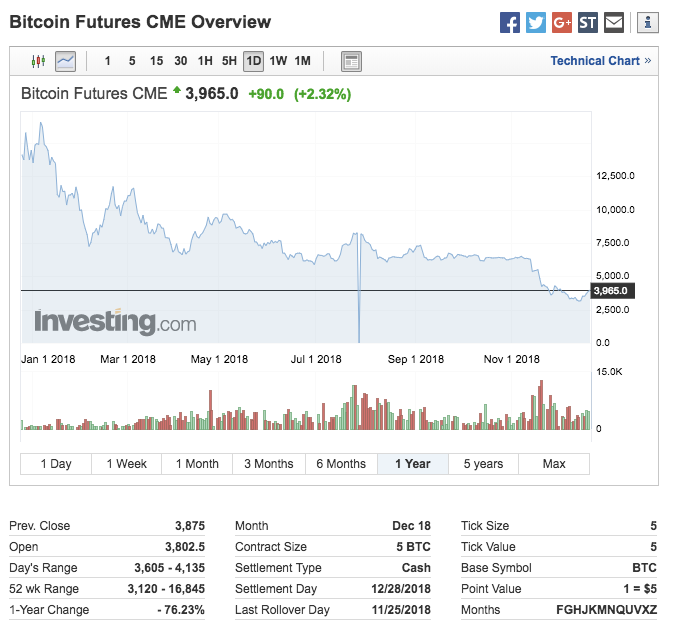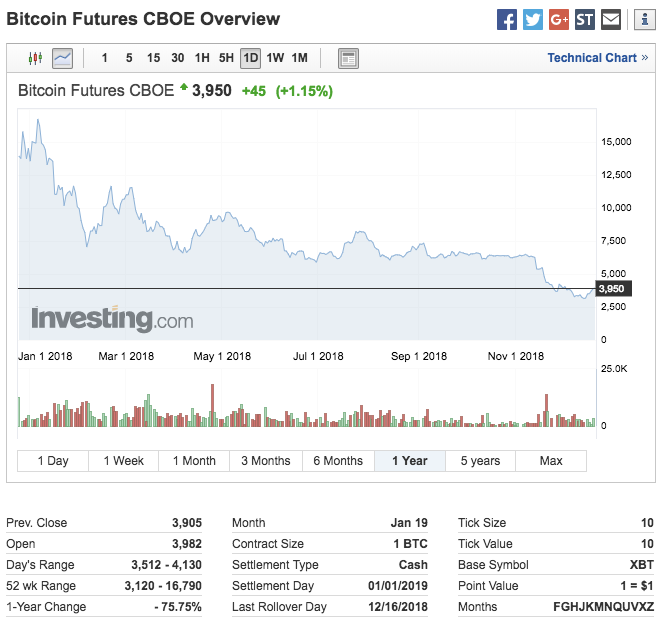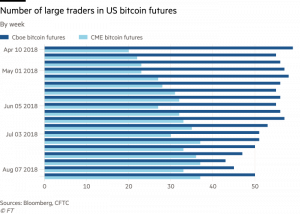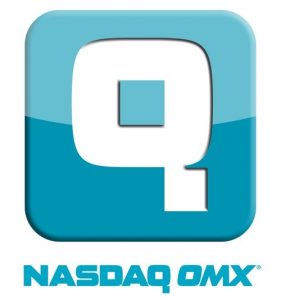This time last year, the market was abuzz with excitement as CBOE’s XBT futures contracts and CME Group’s bitcoin derivatives products launched for the first time. There is no doubt that BTC futures trading has given some legitimacy to the asset class. Fast forward one year and there has been slow growth due to the market downturn, but overall demand for products is increasing.
Also Read: Nasdaq Confirms Plans to Launch Bitcoin Futures in First Half of 2019
High Margin Requirement Reduced Demand
CBOE and CME are Chicago’s largest derivatives exchanges. The launch of bitcoin futures has played a significant role in driving institutional demand for crypto assets. The margin requirement for BTC futures at CME is 35 percent, while at CBOE it’s 40 percent to account for bitcoin volatility. These products give investors the ability to hedge and arbitrage. When the value of an account drops below the maintenance level, a margin call is triggered. The margin is like a down payment or a deposit that a market participant posts with the exchange clearing house.

According to one source, a factor which has slowed growth of bitcoin futures has been the margin requirement, which has been extremely high. As a result, the contracts’ utility has been weakened as an efficient hedge due to the opportunity cost of capital.

CME Volumes Outpace CBOE Volumes
Cristian Gil, CEO of GSR, has highlighted the fact that recently CME volumes have significantly outpaced CBOE volumes, especially from a notional standpoint, as a 1 BTC CME contract is worth five times CBOE’s XBT product.

“The vast majority of trading volumes has come from speculators, not market participants looking to hedge natural BTC risk, for example miners or ICOs. Since these products are financially settled, there has been no need to post margin or interact directly with BTC; therefore, much of the trading volume has come from so-called “no-coiners” who are short selling,” said Gil.
Bitcoin futures have also been widely decried as bearish catalysts and the evidence does seem incriminating, adds Gil.
Scandinavia Leading With Product Launches
When it comes to more established BTC products available on the market, the Swedish firm XBT Provider was one of the first to launch an exchange trade note (ETN) on Nasdaq Nordic in 2015. This year, the SEC also approved investor access to XBT Provider’s Bitcoin ETN product which was formerly only available in the European market but then later suspended its trading due to lack of information. 
Laurent Kssis, the CEO of XBT Provider, a Coinshares company, explained that after watching the first year of trading for CME and CBOE bitcoin contracts, he is most struck by the slow pick up in volume, but overall very happy that investors are getting more and more professional tools to access this nascent market.
“As pitched, the main utility of the contracts is as a simple hedge to bitcoin exposure. But in practice, this has often come at a prohibitively high cost,” said Kssis.
Optimistically, he thinks the market is keen to see what Bakkt will deliver as it promises a more efficient product with physical delivery, which should make manipulation at close much more problematic.
“From my perspective, the more fit-for-purpose products available on the market, the better for investors, and that is ultimately who all of us in this industry serve,” finished Kssis.
Have BTC futures exacerbated this year’s bear market? Let us know in the comments section below.
Images courtesy of Shutterstock and Bloomberg.
Need to calculate your bitcoin holdings? Check our tools section.





